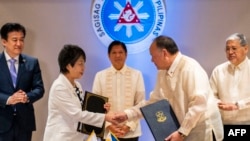Japan and the Philippines signed a key defense pact Monday allowing the deployment of Japanese forces for joint military exercises, including live-fire drills, to the Southeast Asian nation that came under brutal Japanese occupation in World War II but is now building an alliance with Tokyo as they face an increasingly assertive China.
The Reciprocal Access Agreement, which similarly allows Filipino forces to enter Japan for joint combat training, was signed by Philippine Defense Secretary Gilberto Teodoro and Japanese Foreign Minister Yoko Kamikawa in a Manila ceremony witnessed by President Ferdinand Marcos Jr. It would take effect after ratification by the countries’ legislatures, Philippine and Japanese officials said.
Kamikawa called the signing of the defense agreement “a groundbreaking achievement" that should further boost defense cooperation between Japan and the Philippines.
“A free and open international order based on the rule of law is the foundation of regional peace and prosperity," she said. "We would like to work closely with your country to maintain and strengthen this.”
Kamikawa and Japanese Defense Minister Minoru Kihara later held talks with their Philippine counterparts on ways to further deepen relations.
The defense pact with the Philippines is the first to be forged by Japan in Asia. Japan signed similar accords with Australia in 2022 and with Britain in 2023.
Under Prime Minister Fumio Kishida, the Japanese government has taken steps to boost its security and defensive firepower, including a counterstrike capability that breaks from Japan’s postwar principle of focusing only on self-defense, amid threats from North Korea and China’s growing assertiveness. It’s doubling defense spending in a five-year period to 2027 in a move to bolster its military power and make Japan the world’s third-biggest military spender after the United States and China.
Many of Japan’s Asian neighbors, including the Philippines, came under Japanese aggression until its defeat in World War II and Japan’s efforts to bolster its military role and spending could be a sensitive issue. Japan and the Philippines, however, have steadily deepened defense and security ties.
Kishida’s moves dovetail with Marcos’ effort to forge security alliances to bolster the Philippine military’s limited ability to defend Manila’s territorial interests in the South China Sea. The busy sea passage is a key global trade route which has been claimed virtually in its entirety by China but also contested in part by the Philippines, Vietnam, Malaysia, Brunei and Taiwan.
The United States has also been strengthening an arc of military alliances in the Indo-Pacific to better counter China, including in any future confrontation over Taiwan, and reassure its Asian allies. Japan and the Philippines are treaty allies of the U.S. and their leaders held three-way talks in April at the White House, where President Biden renewed Washington's "ironclad" commitment to defend Japan and the Philippines.
Japan has had a longstanding territorial dispute with China over islands in the East China Sea. Chinese and Philippine coast guard and navy ships, meanwhile, have been involved in a series of tense confrontations in the South China Sea since last year.
In the worst confrontation so far, Chinese coast guard personnel armed with knives, spears and an axe aboard motorboats repeatedly rammed and destroyed two Philippine navy supply vessels on June 17 in a chaotic faceoff in the disputed Second Thomas Shoal that injured several Filipino sailors. Chinese coast guard personnel seized seven navy rifles.
The Philippines strongly protested the Chinese coast guard’s actions and demanded $1 million for the damage and the return of the rifles. China accused the Philippines of instigating the violence, saying the Filipino sailors strayed into what it called Chinese territorial waters despite warnings.
Japan and the United States were among the first to express alarm over the Chinese actions and call on Beijing to abide by international laws. Washington is obligated to defend the Philippines, its oldest treaty ally in Asia, if Filipino forces, ships and aircraft come under an armed attack, including in the South China Sea.
